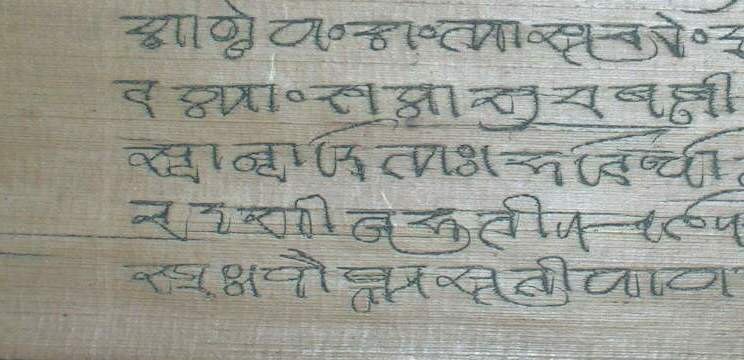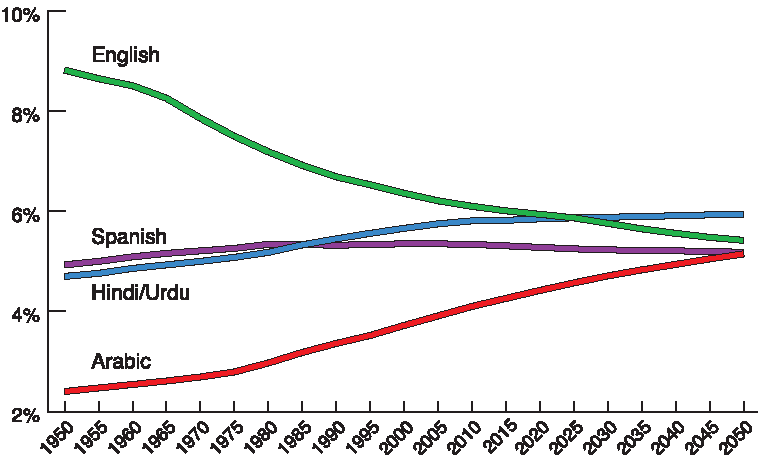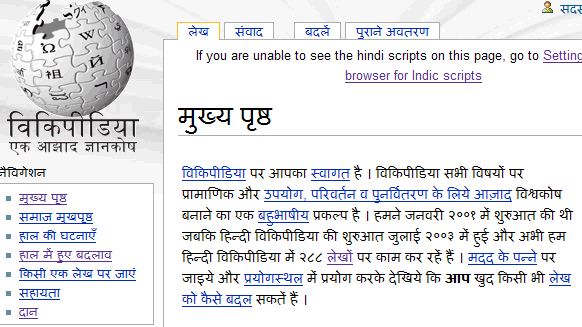Storytelling Science
Internet goes Desi... And you can help!
Amitabha Mukerjee
Dear Reader:You are living in the heart of Hindi land. Perhaps your mother tongue is Hindi, yet you are reading an English paper. For that matter, I am Bengali, but I think better in English.
Why did you and I take the trouble to learn English? If you work down through the layers of reasons, ultimately it is because there is more information available in English. We feel we will be ahead if we know English. The Englishmen got the Americans to use it, so that in 1795 English won out over German as the language for enacting laws (by just one vote). Then we Indians learnt it. And now all of us are talking in English.
What is worse, our children are having to study in English. This despite the fact that repeated studies have established that the child learns best in her mother tongue. So English is actually slowing down your child!

Palm-Leaf Sanskrit manuscript. One reason why India couldn't keep its position in the world was because Indian learning was conducted in a language other than the mother tongue.
Let me ask another question. How did the Englishmen get to be where they are, and how come we Hindi speakers, who were way ahead until the 1600's, fell so far behind? My respected scholar-friend A.P. Shukla of IIT Kanpur believes that in part it is because around then, the Royal Society moved the language of science from Latin to English. At that time, in India, the Sanskrit scholar Tulsidas had just composed Ramcharitmanas in Hindi (thirty years before the King James' Bible). But all scholarly work was in Sanskrit. If you go to an old temple, chances are there have a a room piled high with decaying palmleaf manuscripts. Even those days, few could read them. (How can we preserve them? Ah, that's a story for another day.)
Hindi Internet
When England moved from Latin to English, education became more widespread, and soon lots of people started producing knowledge, propelling the entire nation into the Industrial Age. Advanced nations like India and China were left far behind. By 1835, Thomas Macaulay, of the Supreme Council of India, could say:I have never found any native who could deny that a single shelf of a good European library was worth the whole native literature of India and Arabia.And there is a lot of truth in it (which is why it hurts). This was possible because his entire nation was contributing to those shelves, whereas in India, formal Sanskrit education was very much the preserve of a small elite.
There are hints that today's internet age is finally turning the tables. Since 1998, more new non-English websites are coming up than are English ones. Languages like Thai, Vietnamese, and even Romanian, have a far bigger footprint on the web than Hindi! In Japan, 95% of the internet viewing is in Japanese; part of the success of that nation also comes from an 1868 decision to reformulate the world's knowledge in Japanese:

The percentage of the world's population speaking English is falling, and will be below Hindi by 2025. [David Graddol, Science, Feb 2004]
Knowledge shall be sought from all over the world and thus shall be strengthened the foundation of the imperial polity. - Emperor Meiji's 'Charter Oath,' April 1868So why is your child still being forced to learn Physics in English?
What you can do: Wikipedia
Things are changing faster than you think. Here is a website for a Hindi encyclopedia - except it expects you to write it. This is the Hindi Wikipedia - an encyclopedia that everyone can contribute to. Do you have a favourite topic, something you know about? Go ahead, help contribute the cause of knowledge in Hindi.All these years, there was no standard way of showing Hindi on the screen, and different groups were creating Hindi documents that other groups couldn't read. Today there is a standard called UNICODE, and it comes pre-installed on MS Windows, or you may need to add the support from your Windows CD. But mostly, you should be able to read the Hindi Wikipedia page without too much effort! The English Wikipedia was started as a cooperative project in January 2001. Already it is overtaking professional encyclopedias like Encarta in the depth and timeliness of coverage. A dedicated team of thousands of volunteers ("Wikipedians"), are fuelling this growth. Wikipedias in other languages are booming too. And even in India, three Indian languages - Hindi, Tamil, and Kashmiri - have crossed the 100 article mark, while a number of others (like Bengali, where I am the main contributor to date), are starting up.
Can't type Hindi? No excuse! Go to http://hi.wikipedia.org/ and download the Aksharmala keyboard. You'll have to register, but its free, and you'll be glad you can send UNICODE e-mails that all applications can read! After that, why not create an article in the Hindi Wikipedia - just translate from the English Wikipedia, editing as you see fit?

The Hindi Wikipedia. See that "badlen" button on top - you can use it to edit even this page!
Get it, or get your favourite computer person to get it, then try it out. Yes, Madam! This is for you too! Changes in the role of women drives social change across generations. So dive in, create the learning tools of tomorrow, in your own language. Help your kids learn, and while at it, have them tell their stories on Wikipedia!
Yours Storytellingly
Amitabha
P.S. A few days hence, you will wish you did. So might as well cut this article out ... now!